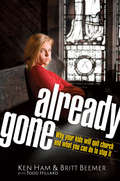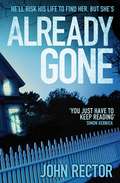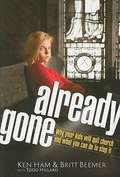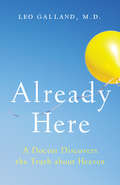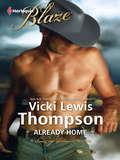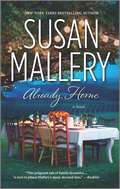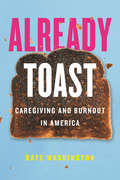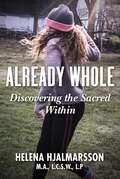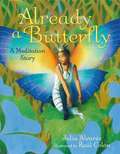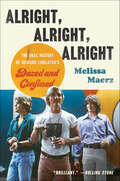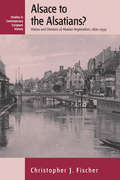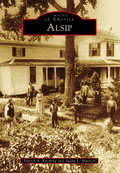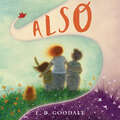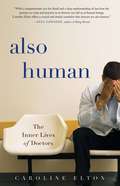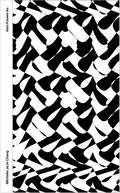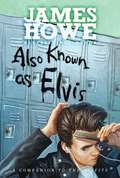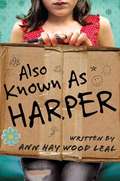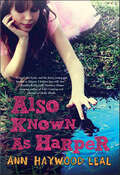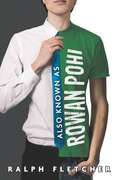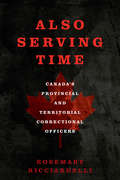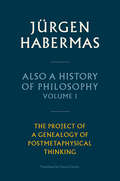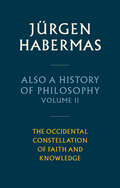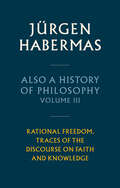- Table View
- List View
Already Gone
by Ken Ham Britt Beemer Todd HillardOver 100,000 copies in print! If you look around in your church today, two-thirds of the young people who are sitting among us have already left in their hearts; soon they will be gone for good. This is the alarming conclusion from a study Answers in Genesis commissioned from America's Research Group, led by respected researcher Britt Beemer. The results may unnerve you - they may shake long-held assumptions to the core - but these results need to be taken seriously by the church. Already Gone reveals: * Why America's churches have lost an entire generation of believers * The views of 1,000 twenty-somethings, solidly raised in the church but no longer attending - and their reasons why * Relevant statistical data effectively teamed with powerful apologetics The study found that we are losing our kids in elementary, middle school, and high school rather than college, and the "Sunday school syndrome" is contributing to the epidemic, rather than helping alleviate it. This is an alarming wake-up call for the church, showing how our programs and our approaches to Christian education are failing...and our children are paying the price. Though the statistics reveal a huge disconnect taking place between our children and their church experience, Already Gone shows how to fight back for our families, our churches, and our world. We can make a difference today that will affect the statistics of tomorrow in a positive and Christ-focused way!
Already Gone
by John RectorJake Reese is an ordinary guy with an ordinary job, trying to block out the memory of his violent past by planning for the future with his new wife, Diane. But the past has a habit of refusing to stay buried... When two men attack Jake in a car park and cut off his ring finger, he tries to dismiss it as an unlucky case of being in the wrong place at the wrong time. But when events take a more sinister turn and Diane goes missing, Jake knows he can no longer hide from the truth. As he embarks on a mission to find Diane, Jake finds himself dragged back into the life he thought he had walked away from forever and the days ahead begin to unfold in terrifying ways...
Already Gone: Why Your Kids Will Quit Church and What You Can Do To Stop It
by Ken Ham Britt Beemer Todd HillardThe book analyses the most common reasons young people give for leaving the church as young adults and why they have no intention of coming back.
Already Here: A Doctor Discovers The Truth About Heaven
by Leo GallandAlready Here tells of the death of Leo Galland’s son, Christopher, at the age of 22; the direct visual evidence Christopher showed him that our souls do go on; and the communications he received from Christopher’s spirit that dramatically changed Leo’s understanding of life and its meaning. In life, Christopher was a brain-damaged special needs child who challenged everyone he knew with his unpredictable behavior and uncanny insights. After his death, he revealed to Leo the real purpose of his life, as a spiritual guide who taught others by confounding their assumptions and expectations. And he began to share with Leo a new perspective on everything from the nature of good and evil to the concept of timelessness to the notion that the universe is, fundamentally, an act of love. Christopher’s wisdom was revealed to Leo over the course of a year, coalescing into three themes, which Leo calls the Gift of the Opposite, the Gift of Presence, and the Gift of Timelessness. Leo quickly came to realize that these gifts were not for him alone: they contain ancient wisdom, held sacred in many traditions, that Chris intended him to share with others. He has written this book, under Chris’s direction, to do just that. Already Here presents a unique dialogue in which an analytical, scientific mind tries to comprehend truths from another plane of existence—one that, nonetheless, is inseparable from our own. Chris describes Heaven and Earth, spirit and matter, as unified opposites that cannot exist without each other and cannot be separated from human consciousness. The book takes its title from Christopher’s final message to Leo, in which he describes Heaven as an “eternal present” where everyone is together, even those of us still living earthly lives. “Lighten up,” Christopher says to his father. “You’re already here, you know.”
Already Home
by Vicki Lewis ThompsonDaredevil videographer Langford "Hutch" Hutchinson has put his career on hold to help his widowed father run their family store in Wyoming. He doesn't mean to stay in town for long-though it's long enough to rekindle his lust for Trina Bledstone. Hutch always had a thing for Trina, but she's his best friend's sister-and that meant hands off!But Trina still has the power to set his pulse racing-and her brother isn't around to stop them from exploring their sizzling chemistry this time.... A Sons of Chance series novella.
Already Home (Mira Ser.)
by Susan MalleryAfter nearly a decade as a sous-chef in a trendy eatery, Jenna is desperate for a change. She's supported her ex-husband's dreams for so long that she can't even remember her own. Until she sees a for-lease sign near her parents' home and envisions her very own cooking store.Her crash course in business is aided by a streetwise store manager and Jenna's adoptive mother. But just as she's gaining a foothold in her new life, in walk her birth parents-aging hippies on a quest to reconnect with their firstborn.Now Jenna must figure out how to reconcile the free-spirited Serenity and Tom with her traditional parents, deal with her feelings for a new love interest and decide what to do about her ex's latest outrageous request. In the end, Jenna will find that there is no perfect family, only the people we love....
Already Toast: Caregiving and Burnout in America
by Kate WashingtonThe story of one woman's struggle to care for her seriously ill husband--and a revealing look at the role unpaid family caregivers play in a society that fails to provide them with structural support.Already Toast shows how all-consuming caregiving can be, how difficult it is to find support, and how the social and literary narratives that have long locked women into providing emotional labor also keep them in unpaid caregiving roles. When Kate Washington and her husband, Brad, learned that he had cancer, they were a young couple: professionals with ascending careers, parents to two small children. Brad's diagnosis stripped those identities away: he became a patient and she his caregiver.Brad's cancer quickly turned aggressive, necessitating a stem-cell transplant that triggered a massive infection, robbing him of his eyesight and nearly of his life. Kate acted as his full-time aide to keep him alive, coordinating his treatments, making doctors' appointments, calling insurance companies, filling dozens of prescriptions, cleaning commodes, administering IV drugs. She became so burned out that, when she took an online quiz on caregiver self-care, her result cheerily declared: "You're already toast!" Through it all she felt profoundly alone, but, as she later learned, she was in fact one of millions: an invisible army of family caregivers working every day in America, their unpaid labor keeping our troubled healthcare system afloat. Because our culture both romanticizes and erases the realities of care work, few caregivers have shared their stories publicly. As the baby-boom generation ages, the number of family caregivers will continue to grow. Readable, relatable, timely, and often raw, Already Toast--with its clear call for paying and supporting family caregivers--is a crucial intervention in that conversation, bringing together personal experience with deep research to give voice to those tasked with the overlooked, vital work of caring for the seriously ill.
Already Whole: Discovering the Sacred Within
by Helena HjalmarssonMany of us have made our lives so noisy, overwhelming, sensory craving and data driven that we have somehow missed the most fundamental part about ourselves and our lives. Learning how to work with every process, every situation, every relationship intuitively; learning to love what is, to let go, to have faith and find stillness; to foster one&’s intuition and become creative in our own lives is something we can all achieve. To illustrate these concepts, Hajlmarsson calls on her decades of experience and work as a psychotherapist. But most significantly, her life as an autism parent, accounted for in her previous books, Finding Lina 2013 and Beyond Autism 2019, which has taught her where to find that elusive freedom and harmony: inside herself. Hjalmarsson believes that the solution to life's chaos, this freedom and harmony—this love—is accessible to all. She writes, "We don&’t earn freedom. We either realize who we are and how we can live free, connected, joyful and expansive lives or we don&’t. We can realize it some of the time and live a little bit connected and a little bit trapped. Or we can learn to realize it most of the time and spend most of our lives fully awake."
Already a Butterfly: A Meditation Story
by Julia AlvarezAlready a Butterfly is a gentle picture book tale about self-soothing practices and self-confidence beliefs.With so much to do in so little time, Mari is constantly on the move, flitting from flower to flower, practicing her camouflage poses, and planning for migration. She’s the busiest butterfly around. But does being productive mean she is happy? Mari couldn’t say. The only way she feels like a butterfly is by acting like one. Little does Mari know, the secret to feeling like herself is simply to focus her breath, find her quiet place, and follow her instincts. With the guidance of a thoughtful flower bud, Mari soon learns to meditate and appreciate that she was a butterfly all along.Acclaimed author Julia Alvarez extolls the importance of mindfulness, reflection, and self-care for young children in this gratifying picture book, stunningly illustrated by award-winning artist Raúl Colón. Christy Ottaviano Books
Alright, Alright, Alright: The Oral History of Richard Linklater's Dazed and Confused
by Melissa MaerzThe definitive oral history of the cult classic Dazed and Confused, featuring behind-the-scenes stories from the cast, crew, and Oscar-nominated director Richard Linklater.Dazed and Confused not only heralded the arrival of filmmaker Richard Linklater, it introduced a cast of unknowns who would become the next generation of movie stars. Embraced as a cultural touchstone, the 1993 film would also make Matthew McConaughey’s famous phrase—alright, alright, alright—ubiquitous. But it started with a simple idea: Linklater thought people might like to watch a movie about high school kids just hanging out and listening to music on the last day of school in 1976. To some, that might not even sound like a movie. But to a few studio executives, it sounded enough like the next American Graffiti to justify the risk. Dazed and Confused underperformed at the box office and seemed destined to disappear. Then something weird happened: Linklater turned out to be right. This wasn’t the kind of movie everybody liked, but it was the kind of movie certain people loved, with an intensity that felt personal. No matter what their high school experience was like, they thought Dazed and Confused was about them.Alright, Alright, Alright is the story of how this iconic film came together and why it worked. Combining behind-the-scenes photos and insights from nearly the entire cast, including Matthew McConaughey, Parker Posey, Ben Affleck, Joey Lauren Adams, and many others, and with full access to Linklater’s Dazed archives, it offers an inside look at how a budding filmmaker and a cast of newcomers made a period piece that would feel timeless for decades to come.
Alsace To The Alsatians?
by Christopher J. FischerThe region of Alsace, located between the hereditary enemies of France and Germany, served as a trophy of war four times between 1870-1945. With each shift, French and German officials sought to win the allegiance of the local populace. In response to these pressures, Alsatians invoked regionalism--articulated as a political language, a cultural vision, and a community of identity--not only to define and defend their own interests against the nationalist claims of France and Germany, but also to push for social change, defend religious rights, and promote the status of the region within the larger national community. Alsatian regionalism however, was neither unitary nor unifying, as Alsatians themselves were divided politically, socially, and culturally. The author shows that the Janus-faced character of Alsatian regionalism points to the ambiguous role of regional identity in both fostering and inhibiting loyalty to the nation. Finally, the author uses the case of Alsace to explore the traditional designations of French civic nationalism versus German ethnic nationalism and argues for the strong similarities between the two countries' conceptions of nationhood.
Alsip
by Susan L. Bruesch Patrick E. KitchingThe village of Alsip got its name from the area's first big business, Frank Alsip's Brickyard. Although Alsip is now known for its tight-knit neighborhoods and large industrial community, it was not always so. Recorded area history goes back to the 1600s, when a Catholic mission stood at 122nd and Loveland Streets, and the first European settlers began farming the area in the 1800s. The historic farmhouse featured on the front cover was homesteaded by DeWitt and Amy Baxter Lane in 1835. Area maps identified this homestead as "Lanes Island" because it was surrounded by marshy swamps. DeWitt's father, Joseph, opened a smithy along a busy Indian trail that passed by Lanes Island and worked until he died in 1839. The tough-as-nails pioneers featured in Images of America: Alsip drained the swampland, which gave rise to a future of fertile farming, eventually leading to the first Village of Alsip board meeting, held on April 26, 1927.
Also
by E. B. GoodaleAn ode to the way memories allow us to be in many places at once, Also is a powerful exploration of being present as well as looking back. Perfect for Mother&’s Day, birthdays, or graduation, this modern classic is by Ezra Jack Keats Honor–winner E. B. Goodale.A moving story that follows one family through generations of time spent together and shows readers that memories allow us to connect to the past, the present, and also each other. This gorgeously illustrated book explores the power of memory, teaches children subtle lessons about the passing of time, and celebrates the cherished bonds we share with those we love. Perfect for reading together every day, or for giving on occasions like graduation, Mother's Day, and birthdays.
Also Human: The Inner Lives of Doctors
by Caroline EltonA psychologist's stories of doctors who seek to help others but struggle to help themselves From ER and M*A*S*H to Grey's Anatomy and House, the medical drama endures for good reason: we're fascinated by the people we must trust when we are most vulnerable. In Also Human, vocational psychologist Caroline Elton introduces us to some of the distressed physicians who have come to her for help: doctors who face psychological challenges that threaten to destroy their careers and lives, including an obstetrician grappling with his own homosexuality, a high-achieving junior doctor who walks out of her first job within weeks of starting, and an oncology resident who faints when confronted with cancer patients. Entering a doctor's office can be terrifying, sometimes for the doctor most of all. By examining the inner lives of these professionals, Also Human offers readers insight into, and empathy for, the very real struggles of those who hold power over life and death.
Also Known As: Uncovering Representational Frameworks in Architecture, Art, and Digital Media
by Michelle JaJa ChangAn exploration of conceptual frameworks common to architecture and digital media.Also Known As offers analogies between objects and architecture, finding shared structures in physical things and architectural ideas, to render ideas relevant to a broad design audience. In this collection of written and visual work, Michelle JaJa Chang bridges conceptual frameworks found in architectural design and contemporary representation to examine design technology&’s social, material, and political effects. In architectural practice, where visual representation typically precedes building, techniques like drawing and imaging do not merely structure appearances. They are schemas, or organizational theories, connecting the abstract to the real. Buildings evidence representation&’s abilities to show how something is (through description) and how things should be (through projection).Also Known As is a book in fragments. Some ideas are examined in depth, in essay form, while others are explored as anecdotal discoveries. Longer essays begin with a description of an object or phenomenon outside of architecture (e.g., a surveillance blimp, ancient bowls, a cartoon) in the manner of case reports. Observations on curious objects and events are also occasions to consider more complex systems in architecture. Richly illustrated and accompanied by an afterword by architect Jesús Vassallo, Also Known As offers a unique perspective for readers interested in architecture, media, computation, design, and arts from the informed perspective of a practitioner.
Also Known as Elvis (The Misfits #4)
by James HoweSkeezie Tookis navigates a pivotal summer of first crushes and tough choices in this conclusion to the bestselling and acclaimed quartet that began with The Misfits.<P> Skeezie Tookis, also known as Elvis, isn’t looking forward to this summer in Paintbrush Falls. While his best friends Bobby, Joe, and Addie are off on exciting adventures, he’s stuck at home, taking care of his sisters and working five days a week to help out his mom. <P>True, he gets to hang out at the Candy Kitchen with the awesome HellomynameisSteffi, but he also has to contend with Kevin Hennessey’s never-ending bullying. And then there’s the confusing world of girls, especially hot-and-cold Becca, his maybe-crush. And the dog that he misses terribly. And the dad who left two years before, whom Skeezie is convinced is the cause of all his troubles. In the words of the King, Skeezie Tookis is All Shook Up.<P> Skeezie’s got the leather jacket of a tough guy, but a heart of gold—and his story, the fourth and final chapter of the beloved Misfits series, is brimming with life’s tough choices, love in all directions, and enough sweet potato fries to go around.
Also Known as Harper
by Ann Haywood LealHarper Lee Morgan is an aspiring poet, which isn't surprising, seeing as how she's named after her mama's favorite writer, Harper Lee. And life is giving her a lot to write about just now. Daddy up and walked out, leaving them broke. Then Harper's family gets evicted. With Mama scrambling to find work, Harper has to skip school to care for her little brother, Hemingway. Their lives have been turned upside down, which Harper could just about handle--if it wasn't for the writing contest at school. If only she could get up on that stage and read her poems out loud ...
Also Known as Harper
by Ann Haywood LealHarper Lee Morgan is an aspiring poet, which isn't surprising, seeing as how she's named after her mama's favorite writer, Harper Lee. And life is giving her a lot to write about just now. Daddy up and walked out, leaving them broke. Then Harper's family gets evicted. With Mama scrambling to find work, Harper has to skip school to care for her little brother, Hemingway. Their lives have been turned upside down, which Harper could just about handle—if it wasn't for the writing contest at school. If only she could get up on that stage and read her poems out loud . . .
Also Known as Lard Butt
by Ann HerrickLaura discovers that Ricky, the boy who created her horrible nickname, Lard Butt, has moved back into town--and immediately schemes to keep him quiet. After all, she can't let her new swim teammates, especially drool-worthy Noah, hear the horrible name! No way! She's determined to put a million years between grade school and junior high--even in the face of a father who drives an éclair...
Also Known as Lard Butt
by Ann HerrickLaura finds out that, Ricky, the boy who created her horrible nickname, "Lard Butt," has moved back into town—and immediately schemes to keep him quiet. After all, she can't let her new swim teammates, especially drool-worthy Noah, hear the horrible name! No way! She's determined to put a million years between grade school and junior high—even in the face of a father who drives an éclair, a would-be-movie-star mother who suddenly moves back home, and a past that comes back to haunt her with the dreaded nickname. Although Laura's embarrassed about how she looks in a swimsuit, she tries to stay true to her vow to take risks. She even lets Maria talk her into going to the school dance, where she braves negotiating a truce for a quarreling couple. New friendships form, Laura's mother starts getting too domesticated for Laura's comfort, and hints of romance start to develop—or do they?
Also Known as Rowan Pohi
by Ralph FletcherWill the real Rowan Pohi please stand? To dispel boredom while waiting for tenth grade to begin, Bobby and his friends create an imaginary kid named Rowan Pohi (that's IHOP backwards) and apply to the prestigious Whitestone Prep in Rowan's name. When, surprisingly, Rowan's application is accepted, Bobby impulsively reinvents himself as Rowan and embarks on an edgy life of deception in the rarefied world of Whitestone. Told with Ralph Fletcher's trademark blend of humor and depth, the story of Rowan's rise and fall is a funny, poignant, and suspenseful riff on the adolescent search for identity. The e-book includes a sample chapter from Flying Solo by Ralph Fletcher.
Also Serving Time: Canada’s Provincial and Territorial Correctional Officers (G - Reference, Information And Interdisciplinary Subjects Ser.)
by Rosemary RicciardelliAlso Serving Time informs readers about the realities of provincial and territorial prison work in Canada. Exploring the nuances of the job, Rosemary Ricciardelli shows how officer orientations and attitudes toward prisoners are interconnected and foundational in shaping their prison experiences as well as that of those in custody and in managerial and administrative positions. Drawing on interviews with 100 correctional officers from a range of provincial prisons and with experience working in territorial prisons, Ricciardelli provides theoretical and applied explorations of officer orientations, interpretations, and risk propensity to show how perceptions, attitudes, and beliefs—both at the individual and structural levels—shape prison practices. Also Serving Time unpacks how gender informs the actions and self-presentation of correctional officers and informs readers about the officers’ experiences when working with male and female adult prison populations. Ricciardelli confirms that tasks of daily living underpinned by pervasive risk potential shape prison work. Through the officer accounts presented, she provides an opportunity for readers to explore how punishment and ‘rehabilitation’, gender, and the hierarchical structure of prison management shape officers’ daily realities.
Also a History of Philosophy, Volume 1: The Project of a Genealogy of Postmetaphysical Thinking
by Jürgen HabermasThis is the first volume of a ground-breaking new work by Jürgen Habermas on the history of philosophy. In this major new work, Habermas sets out the ideas that inform his systematic account of the history of Western philosophy as a genealogy of postmetaphysical thinking. His account goes far beyond a vindication of the enduring relevance of philosophical reflection founded on communicative reason as a source of orientation in the modern world. He contrasts this conception with prominent diagnoses of the supposed crisis of Enlightenment reason and culture that seeks redemption in the affirmation of traditional religious authority (Schmitt), the timeless validity of Greek metaphysics (Strauss), a numinous conception of nature (Löwith), and an occurrence of being that speaks to us from beyond the mists of pre-Socratic thought (Heidegger). Habermas situates Western philosophy in relation to traditions of thought founded in the major worldviews (Judaism, Buddhism, Confucianism and Taoism) that continue to shape contemporary culture and civilization. At the same time, he lays the groundwork for his analysis in the later volumes of the constitutive role played by the discourse on faith and knowledge in the development of Western philosophy, which is the result of the unique symbiosis that Christianity entered into with Greek thought with the Christianization of the Roman Empire. Far from raising claims to exclusivity, completeness or closure, Habermas’s history of philosophy, published in English in three volumes, opens up new lines of research and reflection that will influence the humanities and social sciences for decades to come.
Also a History of Philosophy, Volume 2: The Occidental Constellation of Faith and Knowledge
by Jürgen HabermasIn this second volume of his groundbreaking new work on the history of philosophy, Jürgen Habermas traces the development of Western thought from the reception of Platonism by early Christian thought, through the revolution in medieval philosophy and theology triggered by the rediscovery of Aristotle’s works, up to the decoupling of philosophical and theological thought in nominalism and the Reformation that ushered in the postmetaphysical thinking of the modern age. In contrast to conventional histories that focus on movements and schools, Habermas takes the dialectic of faith and knowledge as a guiding thread for analysing key developments in the thought of major figures such as Augustine, Aquinas, Scotus, Ockham and Luther that constitute milestones in the genealogy of postmetaphysical thinking. A distinctive feature of Habermas’ approach is the prominence he accords practical philosophy, and in particular legal and political ideas, and the corresponding attention he pays to social, institutional and political history, especially as these bear on the relationship between church and state. As a result, the central preoccupations of Christian thought are shown to be original responses to questions raised by the Christian worldview that exploded the framework of Greek metaphysical thinking and remain crucial for the self-understanding of contemporary philosophy. Far from raising claims to exclusivity, completeness or closure, Habermas’s history of philosophy, published in English in three volumes, opens up new lines of research and reflection that will influence the humanities and social sciences for decades to come.
Also a History of Philosophy, Volume 3: Rational Freedom. Traces of the Discourse on Faith and Knowledge
by Jürgen HabermasIn the final volume of his history of philosophy, Jürgen Habermas offers a series of brilliant interpretations of the thinkers who set the agenda for contemporary philosophy. Beginning with masterful readings of Hume and Kant, he traces the genealogy of their postmetaphysical thinking through the main currents of historicism and German Idealism, and the multifarious reactions to Hegel’s influential system, culminating in nuanced readings of Marx, Kierkegaard and Peirce. Through his analysis of their work, Habermas demonstrates the interpretive fecundity of the central themes of his philosophical enterprise – his pragmatist theory of meaning, his communicative theories of subjectivity and sociality, and his discursive theory of normativity in its moral, juridical and political manifestations. In contrast to the bland compendia of thinkers and positions generally presented in surveys of the history of philosophy, Habermas’s thematically focused interpretations are destined to provoke controversy and stimulate dialogue. With this work one of the indisputably great thinkers of our time presents a powerful vindication of his conception of philosophy as an inherently discursive – and not merely analytical or speculative – enterprise.
